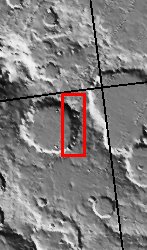
Released 7 August 2003
Large grooves indicating tectonic faulting cross this image from the upper right to the lower left. This image is located not too far south of the Tharsis Montes, which probably produced the faulting seen here as they erupted and uplifted the terrain. Many craters are apparent on the surface here, some of which have impacted on the grabens (grooves), indicating that they are younger than the faults. The crater in the center of the image appears to have been breached, allowing material (perhaps a mudslide) to spill to the west. Could this flow be caused by an earthquake that occurred when the faults moved, or did it happen much later?
Image information: VIS instrument. Latitude -35.7, Longitude 324.1 East (35.9 West). 19 meter/pixel resolution.
Note: this THEMIS visual image has not been radiometrically nor geometrically calibrated for this preliminary release. An empirical correction has been performed to remove instrumental effects. A linear shift has been applied in the cross-track and down-track direction to approximate spacecraft and planetary motion. Fully calibrated and geometrically projected images will be released through the Planetary Data System in accordance with Project policies at a later time.
NASA's Jet Propulsion Laboratory manages the 2001 Mars Odyssey mission for NASA's Office of Space Science, Washington, D.C. The Thermal Emission Imaging System (THEMIS) was developed by Arizona State University, Tempe, in collaboration with Raytheon Santa Barbara Remote Sensing. The THEMIS investigation is led by Dr. Philip Christensen at Arizona State University. Lockheed Martin Astronautics, Denver, is the prime contractor for the Odyssey project, and developed and built the orbiter. Mission operations are conducted jointly from Lockheed Martin and from JPL, a division of the California Institute of Technology in Pasadena.

